Abraham’s Faith & Faithfulness
Today’s Christian is saved by grace through faith in the finished work of Jesus Chr![]() ist on the Cross. He or she lives, or “walks”, by faith with much counsel from the Word of God. While Abraham was an Old Testament believer, he did believe God and His promise to provide redemption, and he was declared righteous because of his faith in the One True God (Gen. 15:6). We’re just like Abraham in many ways, but we have the privilege to know of the finished work of Christ on the Cross. Either way, believers of all ages are declared righteous and “walk by faith”, as Abraham did. We live according to what we believe about God and His revealed Truth.
ist on the Cross. He or she lives, or “walks”, by faith with much counsel from the Word of God. While Abraham was an Old Testament believer, he did believe God and His promise to provide redemption, and he was declared righteous because of his faith in the One True God (Gen. 15:6). We’re just like Abraham in many ways, but we have the privilege to know of the finished work of Christ on the Cross. Either way, believers of all ages are declared righteous and “walk by faith”, as Abraham did. We live according to what we believe about God and His revealed Truth.
The believer’s walk is a spiritual walk, originated and empowered by God. We cannot afford to assume that we can “go it alone”, as Abraham has adequately demonstrated. Our humble dependence on the Lord is essential, getting closer & closer to Him as we go. It is not a lonely walk because we walk along with Him.
As with Abraham, we all have the challenge of walking faithfully and worthy of the calling of God in our life. We have been following Abraham’s life beginning with Genesis 12 and we have observed two key things: his human frailty, and his steadfast faith. God has allowed tests to come along that challenge and prove Abraham’s faith, not always perfectly, sometimes with God’s intervention needed. Through the trials of life, Abraham’s faith was strengthened.
Please pause here and open your Bible and read through Genesis 16-20 in one sitting before you continue on through this Bible Study.

Genesis 16, Going ahead of God
Hagar & Ishmael
Early in Abram’s life in Canaan, there was a famine, as reported in Gen. 12, and Abram took Sarai to Egypt in order to survive. It is thought by many Bible scholars that this was a failure in Abram’s faith, not only because he didn’t stay in the promised land of Canaan where God was committed to provide for him, but also because he lied about Sarai being his wife in order to protect them both, seemingly not thinking that God had already shown Himself capable of protection.  Abram’s reliance on the protection of local customs may have worked partially, but the Lord brought sickness on Pharoah’s house because Sarai was compromised, and this brought suspicion on Abram. Once discovered, this resulted in his being escorted out of Egypt, and it is surmised that Abram had purchased Hagar as a servant and brought her back to Canaan on his return.
Abram’s reliance on the protection of local customs may have worked partially, but the Lord brought sickness on Pharoah’s house because Sarai was compromised, and this brought suspicion on Abram. Once discovered, this resulted in his being escorted out of Egypt, and it is surmised that Abram had purchased Hagar as a servant and brought her back to Canaan on his return.
Now Abraham is about 85 years old, and Sarai responds to her 10 years of being childless differently than childless Hannah did in 1 Sam. 1. Hannah humbled herself and waited on God to work and He gave her Samuel. Sarai took matters into her own hands and used a common custom of the day to convince Abraham that he should take Hagar as his wife(Gen. 16). In spite of God already rejecting this idea of a “substitute heir” (Gen. 15:2-4), Abraham makes another bad decision. After Hagar became pregnant, Sarai had a change of heart (guilt, jealousy) and complained to Abraham and Hagar was sent packing out into the wilderness (Gen. 16:6). The next verses are a great passage about the grace of God as He sends His angel to care for Hagar, gives her good news about her son, and sends her back to Abram’s camp. Hagar was even inspired to speak a special name of God, “El-Roi”, the God Who Sees. The Angel of the Lord occurs additional times in the OT and is understood to be a “preincarnate” (before appearing in the flesh) appearance of the Son of God.
Abraham’s Faith Falters
- If we circumvent/improvise/help God’s plan, trying to make something happen “one way or another”, that’s always a mistake. If a plan is God’s will, He will accomplish it Himself, without any assistance from us.
- Abraham’s life is a series of obstacles, each has to be faced after God allows its occurrence and Abraham must return to his faith in God. This reflects the experience of every believer who faces cycles of challenge to their faith.
- Gen. 16:2, “the Lord prevented”? Interesting to think of how God might sometimes work that way in our life. We want to anticipate “the Lord provided”, but we can’t presume on God, we wait on Him. Perspective: We don’t Presume, We don’t expect God to Prevent, We wait on God to Provide.
- Sarai’s human response was “Go in to my maid!” Abram’s mistake was to listen… is this the valiant man of faith that we know Abraham to be? Doubting God’s word, like Adam & Eve – they opted for a fleshly disobedient solution. Sarai sought to control the will of God by seizing the initiative out of God’s hands.
- A higher view of God’s plan for our lives is “delay is not denial”. When we pray for God to do something in our life, sometimes God answers by saying “wait”. Other times, He might say “no”. He is still our loving heavenly Father, working the “best” in our life (Rom. 8:28-29).
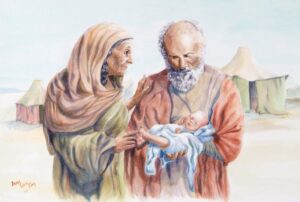
Gen. 16:5-6 – “Oh, the drama of love…“
- As often occurs in the Bible’s narratives, the reader is not given all the background and dialog involved in the event. It’s likely that there was much more interaction between Abram & Sarai. Hagar may have even been trying to persuade Sarai to do this.
- In interpreting historical narrative in the Bible, readers need to ask “why did the writer record this?” and/or “why did God inspire this be included?” Abram and Sarai needed to learn that human performance is not the key to a relationship with God; faith, obedience, and perseverance are!
- Everything Sarai did was culturally/legally acceptable, but her attitude was not right before God. Abram, as the head of the home, was responsible and he should have sought God for the right counsel.
![]() Bible Study Journal
Bible Study Journal
-
-
- We should never let culture guide us rather than God. What do you think?
- Read 1 Samuel 1:10-11, 19-20, 24-28, and note the humility and dependence Hannah expressed in her prayer, and confident expectation of fulfillment.
- Review the twelve faith-recovery experiences of Abraham listed here. We can learn a lot from these passages about how we should claim God’s power and faithfulness in our life. Take the time to read each passage slowly and make some notes about how you can live your faith like Abraham. Gen. 11:30; 12:10; 12:11-20; Gen. 13:1-18; Gen. 14:1-16; Gen. 15:1; Gen. 15:2-3; Gen. 16:6; Gen. 20:1-18; Gen. 21:8-11; Gen. 22:1-19; Gen. 24:5.
- We should never let culture guide us rather than God. What do you think?
-
The Rescue of Our Compassionate God
Gen. 16:7-16, The Angel of the Lord
- This is the first of 48 appearances in the OT of the Angel of the Lord. Here & often, God Himself is present; other times, it is an angelic messenger. In all instances, you need to study context in order to determine whether or not it is God Himself. Likely here it is God Himself being referenced.
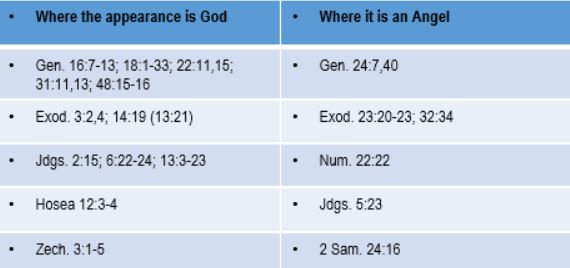
- God is asking Hagar questions –
- He is not trying to figure things out, as a human would be. He is seeking to guide Hagar to understand.
- God has no lack or lapse of knowledge and understanding for any situation. As we pray to Him for our needs, we need to understand that perspective.
- Jer. 29:11, God says “I know the plans I have for you.”
Gen. 18 – Drama of the Highest Magnitude
Gen. 18:1 – God Promises Abraham a Son
- Hebron was located about 9 miles southwest of Jerusalem, where Abraham the nomad could wander to provide pasture for his flocks. The Oaks owned by Mamre likely were terebinth trees, and there was likely a grove of them, so the shade could reduce the temperature significantly.
- Abraham humbly receives the three visitors, quickly realizing the One to be God Himself, as he says in Gen. 18:3 “don’t pass by Your servant”.
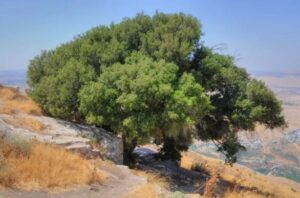
- To appreciate the profound encounter here, compare Jer. 32:17-27 where Jeremiah says “Nothing is too difficult for You”, and God responds in v.27, “Is anything too difficult for Me?”
- Read slowly Abraham’s remarkable account of personal conversation with God. This is one of several distinctive passages in the Bible for such interaction between our holy God and a humble man. Note also the unique combination of divine conversation with the very “earthly” provision of a meal.
- Gen. 18:12-15, Sarah’s laughter at what God was promising is a sad commentary on how poorly we respond to His great work in our lives. This is a regrettable interaction between her and God.
- Gen. 18:16-21 – God’s conversation is a great expression of the Trinity, as He discusses in His three persons (as He did in Creation, Gen. 1:26) on the action He should take regarding Sodom & Gomorrah.
- Gen. 18:17 – God refers to “hiding” some element of His plan, a reference to what Bible scholars refer to as “progressive revelation” – through the ages, God has revealed to man additional details about how He is executing His “master plan” for man. Compare Paul’s speaking of the “mysteries” about the Church which God revealed to him (Eph. 3:1-6)
- Remember:
- Does God change His mind? No, He is expressing truth in a “human” way
- God still knew the ultimate path taken
- Compare Jonah 3:10
- Remember:
- Gen. 18:20 – Note the dramatic expression of the “outcry” emanating from Sodom & Gomorrah – it was the tragic sound of man’s moral rebellion. Does God hear such an outcry out of America today? Even from your city?
- Gen. 18:22ff – This is the first Bible instance of a believer interceding with God for other people’s needs.
-
- Compare Moses’ appeals for his people – e.g. Exo.32:1-14; Numbers 14:11-24
-
- Fellowship with God
- Sacred intimacy – the Lord came to Abraham to check in on him, confirm his faith, and reveal Himself to him
- Genuine humility – Abraham bowed down “to the earth“, face on the ground – have you been there lately?
- Special revelation – God’s knowledge & plan – this is God revealing His mind and will to man, what we have today in the Bible
- Note that there is a unique association between revelation, redemption and protection
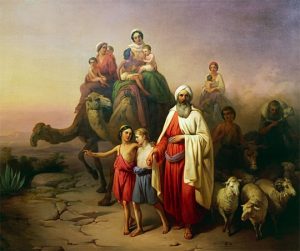
- God revealed Himself to Abraham (Gen.18:1
- Abraham welcomed God’s revelation (Gen.18:2-3).
- Fellowship resulted (Gen.18:4-8). They ate together.
- This fellowship led to further revelation and greater understanding of God’s will (Gen. 18:9-22).
- Having learned of God’s purpose to judge the sinners, Abraham’s response was to intercede for those under God’s judgment (Gen. 18:23-33).
Gen. 19 – Another Rescue
- Compromise distorts values – Lot compromised, choosing the best land, to the southeast of the lower Dead Sea; he would have likely known the close association with Sodom & Gomorrah which would be “part of the package”.
- Lot was “declared righteous” according to 2 Pet 2:7, hard to understand humanly that this could be true, but it is “but by the grace of God” (which includes us…)
- Lot’s faith struggled:
- Lot’s issue was he was happy to be carnal (see 1 Cor. 3:3) – his selfish heart led him to choose Sodom.
- Notice that he was so attached to Sodom that he hesitated about Sodom’s destruction, 19:14-16 – he had gone deeper & deeper into that fallen world of godlessness, and deeper into his own loss
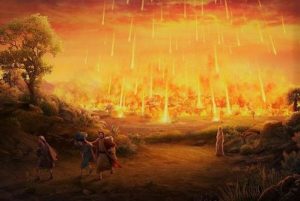 Consider the pictures we have of God’s judgment from Noah and Lot, and note the comments provided in Luke 17:26-30; 2 Pet. 2:6-9.
Consider the pictures we have of God’s judgment from Noah and Lot, and note the comments provided in Luke 17:26-30; 2 Pet. 2:6-9.- Supernatural destruction – One suggestion for this cataclysmic event is that Sodom and Gomorrah were destroyed as a result of an earthquake. The pressure an earthquake generates could have forced deposits of bitumen to the earth’s surface. Bitumen contains a high percentage of sulfur. As these deposits burst upwards into the atmosphere, a surface fire could have ignited the bitumen and produced a blistering rain of brimstone and fire falling from above.
Gen. 20 – Abimelech Again
- Decisions, decisions…
- Just as he had done in Gen. 12, after initially arriving in the land God promised him, Abraham now travels south again 25 years later; this is just before the birth of the Promised Seed of the Messiah in Isaac, and he again jeapordizes the safety of the mother of the Seed as well as the Seed Himself.
- Note that “Abimelech” is a titlular name, like “Pharoah”. However this could be the same man that Abraham had dealt with in Gen. 12. Note also, that Isaac will engage with Abimelech’s son or grandson in Gen. 26.
- So now, Abraham once again “sacrifices” Sarah, 25 years after the first erroneous encounter with Abimelech, really for his own personal “safety” but assisted by Sarah.
- On the brink of Isaac’s birth, the Promised Fulfillment is put in jeopardy, traded away for personal safety. If the promise is ever to be fulfilled, it will owe very little to man. Morally as well as physically, it will clearly have to be achieved by the grace of God.
- Abimelech the Good
- Abimelech (a title more than actual name) apparently had been hearing of the awesome works of the One True God, was willing to hear and act on God’s revelation.
- Abimelech’s integrity and obedience stand in contrast to Abraham’s failure – yet God still claims Abraham as his own.
- In contrast to Sodom, Abimelech’s people responded to God’s direct insertion into the situation and warning him. Abraham’s willingness to acknowledge error is also key to this episode.
- Abraham the Prophet
- Gen. 20:7, God refers to Abraham in the Bible’s first mention of “prophet”; Abraham filled that role, declaring God’s expectations to other nations and interceding for them.
- God was always faithful to Abraham, even though Abraham’s faith sometimes faltered. Abrahams learns that God will fulfill His covenant promises, in spite opposition or ignorance.
Sacrifice
- Abraham sacrificed often in his life:
- His Homeland – he left the comfortable life of “upscale” Ur to move to the Canaan “wilderness”.
- Extended Family – He had a robust family and friends of his upbringing.
- Nephew Lot – Lot had lost his family so he came along with Abram from Ur, likely unsure but needing security.
- Son Ishmael – Abraham really loved Ishmael but he knew he would not be his heir or be the progenitor of God’s people.
- Son Isaac – Although he was sure that Isaac was the promised Seed of the Messiah, and the son God intended to use to carry on the family of Abraham, he still had to obey God.
- What do we sacrifice in our life today? Paul summed up the model of how we are to respond to God after salvation in Rom. 12:1-2 – place ourselves on the altar of surrender and service to God, given over to God’s plan & leading. Do we approach that altar with the same faith-filled obedience that Abraham demonstrated?





